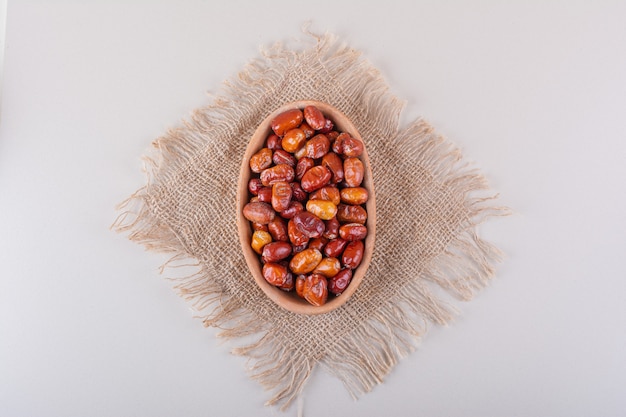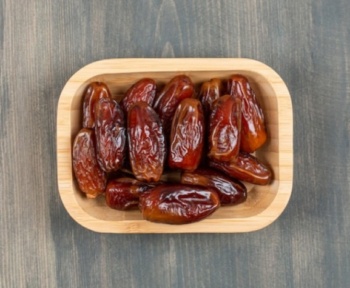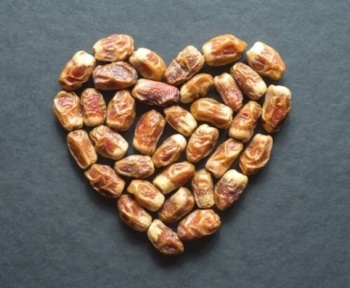Introduction
Let’s settle this once and for all: Are dates just dried plums? They’re both chewy and sweet and can almost look the same in their dried forms. But there’s more to it than meets the eye. In this blog, we’re going to break down the differences between dates and dried plums (or prunes, if you’re into the technical terms). We’ll also explore the health benefits of each and give you some fun facts to impress your friends at your next snack party. By the end of this, you’ll know exactly what sets these two apart and how to make them work for your health.
What Are Dates?
Dates are the fruit of the date palm tree (Phoenix dactylifera). If you’ve ever bitten into one, you know they’re soft, sweet, and a little sticky—kind of like nature’s candy. They’re often dried to concentrate their flavor, which makes them even more irresistible. But here’s the fun part: Dates have a history that’s as rich as their taste. They’ve been around for thousands of years, with origins in the Middle East and North Africa, but nowadays, you can find them growing in warm places all over the world.

Types of Dates
There are quite a few types of dates, and each has its vibe. You’ve probably seen Medjool dates at your local store—they’re big, plump, and gooey-sweet. But there are others, too. Here’s a quick breakdown of some common ones:
- Medjool Dates: These are the heavyweights. They’re large, soft, and have a deep, almost caramel-like flavor.
- Deglet Noor Dates: These are a little more modest—smaller and firmer with a gentler sweetness.
- Barhi Dates: These are honey-like and soft. They’re often enjoyed fresh, but you can find them dried, too.
Table 1: Common Types of Dates and Their Characteristics

What Are Dried Plums (Prunes)?
Dried plums are exactly what they sound like—plums that have been dried. But don’t let the name fool you; prunes aren’t just for your grandparents’ health regimen. They’re tasty little powerhouses with a unique flavor. When plums dry, they become wrinkled and chewy, turning their mild tartness into a sweeter, deeper taste. While fresh plums can be a little tangy, prunes are all about that smooth, almost earthy sweetness.
Prunes are famous for their digestive benefits. Seriously, if you’ve ever heard the saying “prune juice helps with digestion,” it’s not just an old myth. Prunes really do the trick. Grown mostly in Europe and the U.S., these little guys have been around for centuries.

Types of Plums
Plums come in different varieties, but here’s the scoop on the ones that matter for prunes:
- European Plums: These are the go-to plums for drying. They’ve got a thicker skin, which makes them perfect for prunes.
- Japanese Plums: These are what you usually eat fresh. They’re juicy, sweet, and smooth.
Are Dates Dried Plums?
So, the burning question is—are dates just dried plums? The answer is no, though they share some similarities. Dates come from date palms, while prunes are made from plums. It’s easy to see why people might get confused—both are chewy and sweet when dried. But dates are typically larger and softer, with a rich, caramel-like flavor. Prunes are smaller, firmer, and often a little tangier, especially when fresh.
Table 2: Dates vs Dried Plums (Prunes)

Nutritional Comparison: Dates vs Dried Plums
Let’s talk numbers. Dates and prunes both pack a punch when it comes to nutrients, but they offer different benefits. Dates are more of an energy booster, while prunes are all about digestion.

Dates’ Nutritional Benefits
Dates are loaded with natural sugars, making them a quick and easy energy source. Plus, they’ve got a nice stash of potassium, magnesium, and iron—important for keeping your heart healthy, boosting your energy, and helping with blood circulation. Think of dates as your snack of choice when you need a little pick-me-up.
Dried Plums’ Nutritional Benefits
Prunes, on the other hand, are all about fiber. They’re a great choice if you’re looking to keep your digestion on track. They’re lower in sugar than dates, but they’ve got plenty of vitamin K, which is essential for bone health.
Table 3: Nutritional Facts of Dates and Dried Plums (Per 100g)

Benefits of Dates
Dates aren’t just delicious—they’ve got health perks, too. Here’s a rundown of why you should consider adding them to your diet.
Rich in Nutrients
Dates are rich in potassium, magnesium, and iron—important nutrients that help keep your heart in check, boost your energy, and improve blood flow.
Quick Energy Boost
With their natural sugars, dates give you a burst of energy. They’re perfect before a workout, or anytime you need a pick-me-up.
Supports Digestion
Dates are a good source of fiber, which helps your digestion stay smooth. They’re great for keeping things regular.

Heart Health Benefits
Potassium helps regulate blood pressure, so adding dates to your diet could help protect your heart over time.
Fights Anemia
Dates are also packed with iron, which supports red blood cell production and helps fight anemia.
Benefits of Dried Plums (Prunes)
Don’t sleep on prunes—they’re packed with goodness, especially when it comes to digestion.
Digestive Health
Prunes are famous for their ability to keep your digestive system running smoothly. They’re high in fiber and contain sorbitol, which helps things move along. If you’ve ever heard someone swear by prunes for digestion, there’s a reason for it.
Bone Health
Prunes are a surprisingly good source of vitamin K, which is essential for bone health. If you’re looking for ways to keep your bones strong, prunes should be on your radar.
Packed with Antioxidants
Prunes are full of antioxidants, which protect your body from harmful free radicals. This can lower your risk of chronic diseases like heart disease.

Weight Management
Thanks to their fiber content, prunes can help you feel full longer, making them a great snack if you’re trying to manage your weight.
How to Include Dates and Dried Plums in Your Diet
Dates and prunes are easy to work into your daily meals. Here’s how you can start:
How to Eat Dates
Dates are super versatile. You can snack on them as they are, chop them up and toss them in oatmeal or salads, or even blend them into smoothies for a natural sweetener.
How to Use Dried Plums (Prunes)
Prunes are easy to eat straight from the bag, but they also work well in cereal, baked goods, and smoothies. You can even toss them in savory dishes for a unique twist.
Recipe Ideas
- Date Smoothie: Blend dates with almond milk, banana, and a dash of cinnamon for a yummy, energizing drink.
- Prune Energy Balls: Mix prunes, oats, and nuts into little energy bites—perfect for a quick snack.
- Date and Nut Bars: Combine dates, nuts, and seeds for homemade bars that’ll keep you going.
- Prune-Infused Baked Goods: Add prunes to muffins or cakes for extra fiber and a sweet kick.

Interview: Insights from Nutrition Expert Sarah Williams on the Health Benefits of Dates and Prunes
“Dates are a natural energy booster, while prunes work wonders for digestive health. They both have unique roles in a balanced diet, and adding either to your routine can bring significant benefits.”
— Sarah Williams, Registered Dietitian & Nutritionist
Conclusion
So, are dates dried plums? Nope. They’re two different fruits, but they share some delicious qualities. Dates are your go-to for quick energy, while prunes are a digestive powerhouse. Both are packed with nutrients and offer a range of health benefits. Whether you’re looking to boost your energy, improve your digestion, or enjoy a sweet snack, dates and prunes have got you covered.
Mix them into your meals, bake with them, or snack on them as is—they’re versatile and full of flavor. Your body (and your taste buds) will thank you!
FAQs
No, dates and prunes are not the same, though they may appear similar. Dates are the fruit of the date palm tree, while prunes are dried plums. Dates are usually larger, sweeter, and more caramel-like in flavor. At the same time, prunes are smaller, firmer, and have a mildly tart taste. Both are packed with health benefits but serve different nutritional purposes.
Yes, dates are a good source of fiber, which helps to promote healthy digestion. They contain soluble fiber, which aids in moving food through the digestive tract and can help with constipation. However, prunes (dried plums) are often more well-known for their digestive benefits due to their higher fiber content and natural laxative effect.
Both dates and prunes can be part of a healthy diet for weight management, but they serve different roles. Dates are high in natural sugars, making them a good source of quick energy. At the same time, prunes are lower in sugar and higher in fiber, helping to keep you feeling fuller for longer. If weight loss is your goal, prunes may be the better choice due to their higher fiber content.
Yes, you can substitute dates for prunes in many recipes, though they will slightly alter the flavor and texture. Dates are much sweeter and stickier than prunes, so you may need to adjust the amount of sweetener in your recipe. If you’re looking for more fiber and a less sweet option, prunes would be a better fit.
Prunes offer several health benefits. They are well-known for their digestive benefits, helping to relieve constipation due to their high fiber and sorbitol content. Prunes are also packed with antioxidants, vitamins like vitamin K (for bone health), and minerals such as potassium, which can support heart health and help regulate blood pressure.





